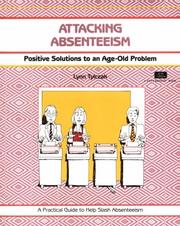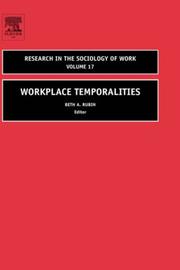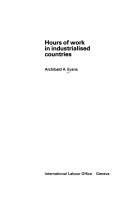| Listing 1 - 10 of 129 | << page >> |
Sort by
|
Book
ISBN: 9282539393 Year: 1984 Volume: vol *49 Publisher: Luxembourg Eurostat
Abstract | Keywords | Export | Availability | Bookmark
 Loading...
Loading...Choose an application
- Reference Manager
- EndNote
- RefWorks (Direct export to RefWorks)
Hours of labor --- Alternative work schedules --- Children --- Labor, Hours of --- Work hours --- Work schedules --- Working-day --- Working hours --- Work --- Labor productivity --- Labor time --- Timekeeping --- Weekly rest-day --- European Union countries --- Statistics --- Travail. Durée. Marché commun européen. Statistique. --- Arbeidsduur. Euromarkt. Statistiek.

ISBN: 1560520426 1417520663 9781417520664 9781560520429 Year: 1990 Publisher: Los Altos, Calif. Crisp
Abstract | Keywords | Export | Availability | Bookmark
 Loading...
Loading...Choose an application
- Reference Manager
- EndNote
- RefWorks (Direct export to RefWorks)
Absentee landlordism. --- Electronic books. -- local. --- Hours of labor. --- Alternative work schedules --- Children --- Labor, Hours of --- Work hours --- Work schedules --- Working-day --- Working hours --- Work --- Labor productivity --- Labor time --- Timekeeping --- Weekly rest-day --- Absenteeism --- Land tenure --- Hours of labor
Multi
ISBN: 9188614395 Year: 2001 Publisher: Göteborg Göteborgs universitet. Historiska institutionen
Abstract | Keywords | Export | Availability | Bookmark
 Loading...
Loading...Choose an application
- Reference Manager
- EndNote
- RefWorks (Direct export to RefWorks)
Theses --- Hours of labor --- History. --- History --- Alternative work schedules --- Children --- Labor, Hours of --- Work hours --- Work schedules --- Working-day --- Working hours --- Work --- Labor productivity --- Labor time --- Timekeeping --- Weekly rest-day

ISBN: 9781849503846 1849503842 0762312688 9786611014865 1281014869 0080498051 9780080498058 9780762312689 9781281014863 6611014861 Year: 2007 Publisher: Amsterdam Boston Elsevier JAI
Abstract | Keywords | Export | Availability | Bookmark
 Loading...
Loading...Choose an application
- Reference Manager
- EndNote
- RefWorks (Direct export to RefWorks)
The global, 24/7 economy and the organizational changes it has generated have enormous implications for the organization, experience and use of time in (and out of) the workplace. In addition to eroding the boundary between home and work, creating time pressures both within and outside of the workplace, the need for businesses to compete in a 24/7 global economy has re-problematized time in the workplace. Drawing on sociology, labor economics, organizational behavior and social history, the papers in this volume examine either empirically or theoretically, a variety of aspects of time in the workplace. Contributors to this volume examine issues surrounding the distribution of and struggle over work hours and how these vary across a number of factors including race, class, occupation and other structural components of work. They examine temporal structures within organizations including inequities in flexible scheduling, entrainment and work teams, polychronicity, and how changing temporal structures affect professionalism and expertise. They also consider the way in which changing uses and organization of work time, in the context of economic instability and globalization, affect the difficulties of reconciling work and family. At the more micro-level, the papers consider individuals' perceptions and constructions and intersubjective constructions of time. To varying degrees, the authors speak to the policy implications or strategies for managing new times. Taken as a whole, these papers shed light on the way in which globalization and the emergence of a 24/7 economy have altered the ways, times, and meanings of time at work. This book series is available electronically online.
Hours of labor. --- Work --- Alternative work schedules --- Children --- Labor, Hours of --- Work hours --- Work schedules --- Working-day --- Working hours --- Labor productivity --- Labor time --- Timekeeping --- Weekly rest-day --- Social aspects. --- Hours of labor --- Sociology: work & labour. --- Social Science --- Sociology --- General.
Book
ISBN: 1282235664 9786612235665 3790821853 3790821845 Year: 2009 Publisher: Heidelberg : London : Physica ; Springer [distributor],
Abstract | Keywords | Export | Availability | Bookmark
 Loading...
Loading...Choose an application
- Reference Manager
- EndNote
- RefWorks (Direct export to RefWorks)
This volume is the second book based on comparative and comprehensive data from the 2003 representative European Union Company survey of Operating hours, Working times and Employment (EUCOWE) in France, Germany, the Netherlands, Portugal, Spain and the United Kingdom. The EUCOWE project is the first representative and standardised European company survey which covers all categories of firm sizes and all sectors of the economy. This volume complements and builds on the first book published in 2007, in which the methodology and the descriptive national findings as well as some first comparative analytical results were presented. In this second book the EUCOWE research team presents in-depth cross-country analyses of the relationship between operating hours, working times and employment in the European Union. Six empirical chapters of this volume provide detailed comparative analyses of the determinants and consequences of the duration and flexibility of opening hours and operating times.
Hours of labor --- Work. --- Industry (Psychology) --- Method of work --- Work, Method of --- Human behavior --- Labor --- Occupations --- Work-life balance --- Alternative work schedules --- Children --- Labor, Hours of --- Work hours --- Work schedules --- Working-day --- Working hours --- Work --- Labor productivity --- Labor time --- Timekeeping --- Weekly rest-day

ISBN: 0669027405 9780669027402 Year: 1979 Publisher: Lexington, Mass. Heath
Abstract | Keywords | Export | Availability | Bookmark
 Loading...
Loading...Choose an application
- Reference Manager
- EndNote
- RefWorks (Direct export to RefWorks)
Labour economics --- Hours of labor --- Horaires de travail --- 331.105 --- #SBIB:316.334.2A553 --- Alternative work schedules --- Children --- Labor, Hours of --- Work hours --- Work schedules --- Working-day --- Working hours --- Work --- Labor productivity --- Labor time --- Timekeeping --- Weekly rest-day --- Verhouding wergevers-werknemers. Industrial relations. Arbeidsverhoudingen--z.o. {658.31} --- Personeelsbeleid en loonbeleid, functieclassificaties --- 331.105 Verhouding wergevers-werknemers. Industrial relations. Arbeidsverhoudingen--z.o. {658.31}

ISBN: 9221012964 9789221012962 Year: 1975 Publisher: Geneva International labour office
Abstract | Keywords | Export | Availability | Bookmark
 Loading...
Loading...Choose an application
- Reference Manager
- EndNote
- RefWorks (Direct export to RefWorks)
Sociology of work --- Personnel management --- Hours of labor --- #SBIB:316.334.2A454 --- 331.3 --- 331.81 --- 331.91 ILO (100) --- Alternative work schedules --- Children --- Labor, Hours of --- Work hours --- Work schedules --- Working-day --- Working hours --- Work --- Labor productivity --- Labor time --- Timekeeping --- Weekly rest-day --- Arbeidssociologie: vakbond en loonbeleid --- Secundaire arbeidsvoorwaarden --- arbeidstijd - werktijd - arbeidsduur --- International Labour Office - ILO --- 331.3 Secundaire arbeidsvoorwaarden
Book
ISBN: 9264210059 9789264210059 Year: 1973
Abstract | Keywords | Export | Availability | Bookmark
 Loading...
Loading...Choose an application
- Reference Manager
- EndNote
- RefWorks (Direct export to RefWorks)
Hours of labor --- Horaires de travail --- AA / International- internationaal --- 331.444 --- 332.811 --- --- Alternative work schedules --- Children --- Labor, Hours of --- Work hours --- Work schedules --- Working-day --- Working hours --- Work --- Labor productivity --- Labor time --- Timekeeping --- Weekly rest-day --- Wekelijkse en dagelijkse arbeidsduur. Deeltijdse arbeid. Flexibiliteit van de arbeid. --- Wekelijkse en dagelijkse arbeidsduur. Deeltijdse arbeid. Flexibiliteit van de arbeid
Book
ISBN: 0471105244 9780471105244 Year: 1985 Volume: 3 Publisher: Chichester Wiley
Abstract | Keywords | Export | Availability | Bookmark
 Loading...
Loading...Choose an application
- Reference Manager
- EndNote
- RefWorks (Direct export to RefWorks)
Hours of labor --- shift systems --- Mental fatigue --- Shift systems --- Shift work --- Shiftwork --- Work shifts --- Industrial management --- Night work --- Fatigue, Mental --- Intellectual fatigue --- Mental exhaustion --- Mental overwork --- Overwork, Mental --- Fatigue --- Alternative work schedules --- Children --- Labor, Hours of --- Work hours --- Work schedules --- Working-day --- Working hours --- Work --- Labor productivity --- Labor time --- Timekeeping --- Weekly rest-day
Book
ISBN: 2867389674 Year: 1993 Publisher: Paris Syros.
Abstract | Keywords | Export | Availability | Bookmark
 Loading...
Loading...Choose an application
- Reference Manager
- EndNote
- RefWorks (Direct export to RefWorks)
Bibliotheek François Vercammen
Flextime --- Horaires variables de travail --- Hours of labor --- 331.31 --- 331.573 --- 658.381 --- Alternative work schedules --- Children --- Labor, Hours of --- Work hours --- Work schedules --- Working-day --- Working hours --- Work --- Labor productivity --- Labor time --- Timekeeping --- Weekly rest-day --- Arbeidsduur. Arbeidsflexibiliteit --- arbeidsduurvermindering --- Temps de travail
| Listing 1 - 10 of 129 | << page >> |
Sort by
|

 Search
Search Feedback
Feedback About UniCat
About UniCat  Help
Help News
News